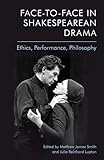Face-to-Face in Shakespearean Drama : Ethics, Performance, Philosophy / Matthew James Smith, Julia Reinhard Lupton.
Material type: TextPublisher: Edinburgh : Edinburgh University Press, [2022]Copyright date: ©2019Description: 1 online resource (304 p.)Content type:
TextPublisher: Edinburgh : Edinburgh University Press, [2022]Copyright date: ©2019Description: 1 online resource (304 p.)Content type: - 9781474435680
- 9781474435703
- 822.3/3 23
- PR3091 .F33 2019
- online - DeGruyter
| Item type | Current library | Call number | URL | Status | Notes | Barcode | |
|---|---|---|---|---|---|---|---|
 eBook
eBook
|
Biblioteca "Angelicum" Pont. Univ. S.Tommaso d'Aquino Nuvola online | online - DeGruyter (Browse shelf(Opens below)) | Online access | Not for loan (Accesso limitato) | Accesso per gli utenti autorizzati / Access for authorized users | (dgr)9781474435703 |
Frontmatter -- Contents -- List of Illustrations -- Acknowledgements -- Introduction -- Part I: Foundational Face Work -- 1. Outface and Interface -- 2. ‘Everybody’s Somebody’s Fool’: Folie à Deux in Shakespeare’s Love Duets -- 3. The Course of Recognition in Cymbeline -- Part II: Composing Intimacy and Conflict -- 4. Face to Face, Hand to Hand: Relations of Exchange in Hamlet -- 5. Bed Tricks and Fantasies of Facelessness: All’s Well that Ends Well and Macbeth in the Dark -- Part III: Facing Judgement -- 6. The Face of Judgement in Measure for Measure -- 7. Then Face to Face: Timing Trust in Macbeth -- Part IV: Moving Pictures -- 8. The Man of Sorrows: Edgar’s Disguise and Dürer’s Self-portraits -- 9. The Face as Rhetorical Self in Ben Jonson’s Literature -- 10. Hamlet’s Face -- Afterword: Theatre and Speculation -- Notes on Contributors -- Bibliography -- Index
restricted access online access with authorization star
http://purl.org/coar/access_right/c_16ec
Explores the drama of proximity and co-presence in Shakespeare’s playsBrings together the rare pairing of philosophical ethics and performance studies in Shakespeare’s playsEngages with the thought of philosophers including Ludwig Wittgenstein, Hannah Arendt, Paul Ricoeur, Stanley Cavell, and Emmanuel LevinasThis book celebrates the theatrical excitement and philosophical meanings of human interaction in Shakespeare. On stage and in life, the face is always window and mirror, representation and presence. It examines the emotional and ethical surplus that appears between faces in the activity and performance of human encounter on stage. By transitioning from face as noun to verb – to face, outface, interface, efface, deface, sur-face – chapters reveal how Shakespeare's plays discover conflict, betrayal and deception as well as love, trust and forgiveness between faces and the bodies that bear them.
Mode of access: Internet via World Wide Web.
In English.
Description based on online resource; title from PDF title page (publisher's Web site, viewed 29. Jun 2022)


